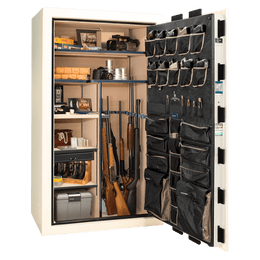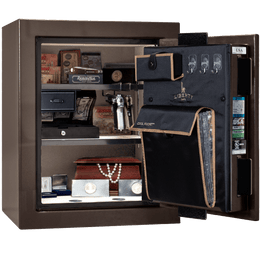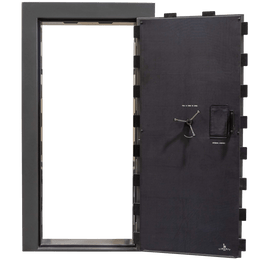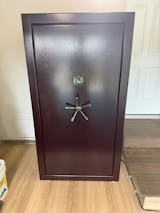A common question we at Liberty Safe often get is whether keeping firearm ammunition in a gun safe is a good idea. If you want to keep your ammunition out of the wrong hands then locking it up in a security safe is one of the best deterrents to theft. In this article, we’re going to go over the pros (and maybe some cons) of storing your ammunition in your gun safe, and see if we can shed some light on the subject to help you make an informed decision.
Benefits of storing ammo in a gun safe
As we mentioned in our article on how to store ammunition safely, there are several benefits to storing ammunition in a humidity-controlled, fire-resistant gun safe. Here are just a few.
Helps prevent ammunition deterioration and damage
Ammunition is more expensive today than it has ever been, and to protect your investment, you should keep your ammunition in a location that is cool, dry, temperature-stable, and ideally secure. Like anything else, ammunition lasts longest when it’s properly stored in a low-humidity, cool place without frequent heat cycles (such as you’d find in a non-climate-controlled attic or garage) from cold to hot, or from warm to very hot. Most experts recommend a temperature around 70 degrees Fahrenheit (or cooler) and humidity levels between 30-50% for long-term storage of valuables, documents, electronics, firearms, and ammunition.
Heat-cycling can cause the gunpowder and priming compounds in ammunition to deteriorate and become less powerful (or completely ineffective), or in extreme cases, it can actually cause pressure spikes that can potentially harm your firearms or yourself.
High humidity can accelerate corrosion and damage to cartridge cases, primers, and bullets, as well as potentially find ingress into the interior of the cartridge and ruin the powder. This is one of the reasons military-grade ammunition often uses waterproof sealant around primers and the bullet-case mouth interface. High humidity also contributes to the breakdown and possibly mold growth of any paper or synthetic cartridge boxes used in storage, which can accelerate corrosion on the exterior of your cartridge cases.
A humidity- and temperature-controlled vault room or gun safe can be an appropriate place to store ammunition, particularly if it’s the only place in your home that is suitable for storage from a temperature and humidity standpoint.
Keeps ammunition out of the hands of kids, unauthorized people, and potential thieves
In some states, you could be held partially or fully liable if you don’t take reasonable precautions to store your guns and ammunition properly and they get lost or stolen. Storing firearms in a secure location, separate from ammunition, is a legal requirement in some locales. For this reason, some people prefer to keep their firearms in a gun safe, and their ammunition in another suitable, secure location like a locked basement storage locker or a locked closet. Some people elect to keep two safes, one for firearms, and one for ammunition. This choice is up to you, but in our view, it makes sense from a security and potential liability standpoint. It also makes it more difficult for bad actors to acquire both firearms and ammunition from one source.
A fire-resistant safe can limit or prevent damage to its contents
When loose ammunition burns in a fire, there’s very little chance of serious harm being inflicted by any flying projectiles, unlike what you might see in the movies. Cartridges are meant to be contained in the chamber of a firearm when they go off, and the chamber is what contains the high pressures of the expanding gunpowder gases and forces the bullet down the barrel at high speed. Without that chamber, the case just ruptures and there’s no high-speed projectile; in fact, the heavier bullet generally remains in place and the lighter case is what may fly off at relatively low speeds.
However, as we noted earlier, even a reasonable supply of ammunition can be more expensive than the firearm that fires it, and storing that ammunition in a secure, fire-resistant, humidity-controlled safe, vault room, or other appropriate storage area is a good idea.
Watch this video to see what happens when ammo is stored in a gun safe with inferior fire protection.
Other methods of storing ammo
There are other places you can store ammo than in a gun safe, but the key points are to make sure the location is secure, temperature-stable, and humidity controlled if you want your ammo to be at its best when you need it. Let’s look at some options and methods.
Ammo cans
Military-type metal or plastic ammo cans are convenient containers for short- or long-term ammunition storage when properly designed and in good working order. You can also use them for carrying your ammo to the range. The good ammo cans are waterproof or sealed against humidity. Ammo cans can be a great way to keep your ammo organized, stacked, and dry. You can use ammo cans to keep your ammo inside a safe, or any suitable location in your home that meets the requirements for proper storage.
Tupperware and other plastic storage containers for ammunition
Ammo cans are not the only way to organize and store ammunition. Tupperware or Rubbermaid-type containers, plastic food-storage buckets, and gallon ziploc-style plastic bags can be excellent and inexpensive ways to keep your ammunition sealed from moisture and organized. The addition of a few inexpensive silica gel desiccant packs inside each container or ammo can is another way to help prevent the effects of humidity.
Accurate labeling is an important part of any effective ammunition storage method
Most people recommend keeping ammunition in its factory packaging where possible. If properly kept in a low-humidity, temperature-stable location, the packaging usually makes it easier to organize and store ammunition, and the labeling of most packaging contains all the relevant information you need to identify the type of ammo, the bullet weight, and other information. If you don’t want to keep the factory boxes, it’s a good idea to cut or tear off the end label and include it with the loose cartridges in whatever sealed container you use, so you can retain the cartridge, bullet weight, and load info.
If you wish to store hand loaded or reloaded ammo, or if you don’t wish to include factory labeling, be sure to clearly label your ammo boxes or containers including all relevant load information.
How long can you store ammo?
There are still people who regularly shoot their stock of WWII-era cartridges, but the supply of this 70+ year-old ammo is drying up. The short answer is that loaded ammunition can be safely stored for many decades, assuming you adhere to the proper storage conditions discussed above. However, in some cases, the combination of the gunpowder and priming compounds used along with the metals in the casings and bullets can combine to form corrosion or powder degradation over time, even when ammo has been properly stored. This has been known to occur even with “non-corrosive” powders and primers in the modern era, so it’s important to check a representative sample of your stored ammunition once or twice a year to make sure it’s not “off-gassing” or deteriorating in storage.
If you find any of your brass cases exhibit pink spotting or staining (indicating the nickel in the brass has been chemically damaged), find pinholes in your brass or steel cases, or note green/blue “verdigris” or other corrosion on your cases or bullets, dispose of that ammo immediately and double-check your storage methods and containers. Gunpowder contains volatile chemicals and oxidizers in a relatively stable, granular form, but powder and primers will still degrade over time like everything else. Heat and humidity can accelerate this process.
How much ammo can you keep in one storage spot?
The usual answer to this question is “as much as you can afford,” but there are some practical limits to how much ammunition you want to store. Some local fire statutes and ordinances may place limits on how much powder or primers you can keep in your home, but this usually doesn’t apply to loaded ammunition. Still, you may want to check your local laws and regulations. Some areas may “suggest” or even require that you keep your firearms and ammunition locked up in separate locations.
In practical terms, it’s a good idea to break up your ammo stores in separate locations in case one of your locations is compromised by flood, fire, or theft, so you don’t lose it all at once.
Store your ammo in a Liberty Safe
If you decide that storing your ammunition inside a fire-resistant safe is right for you, Liberty can help. We have a complete line of home and gun safes of all sizes and capacities and in multiple colors and configurations. Have a look at our online catalog, or use our handy dealer locator to find a showroom near you.










